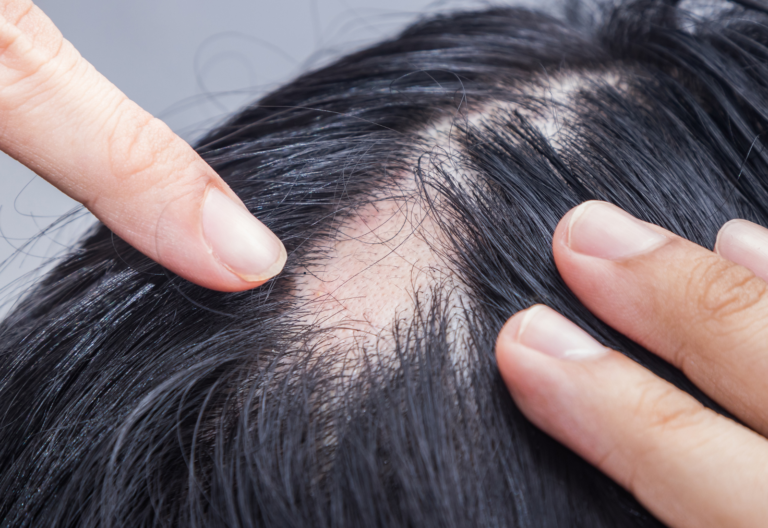Alopecia Solutions
in Maryland
Alopecia Solutions
Alopecia is a common problem that can affect anyone. In fact, alopecia areata affects 1 in every 500-1,000 people in the U.S. This autoimmune disease is characterized by hair loss on the scalp, face, and sometimes other parts of the body. It can make people feel uncomfortable and unhappy with their appearances.
However, you are not alone, and there is hope. There are many alopecia treatment solutions you can choose from based on a few different factors, such as the extent of hair loss, your overall health, and personal preferences. From human hair wigs to PRP therapy and hair transplants, there is a solution tailored for you. Consulting with a hair loss specialist can help you find the best path to restore your confidence and achieve the look you desire.

WHAT IS ALOPECIA?
Alopecia refers to significant hair loss on the scalp and/or across the rest of the body. It occurs in women and men. In some cases, hair loss is permanent, and in others, hair grows back and falls out again. It can be caused by medical conditions, hormonal changes, or genetics.
There are five main types of alopecia:
Common amongst women and men, androgenic alopecia causes a widening of the part in some cases or could cause total or partial baldness. It affects an estimated 50 million men and 30 million women in the U.S.
Causing patchy baldness, alopecia areata can occur anywhere on the body and causes the immune system to attack hair follicles, which affects hair growth. There are lots of alopecia solutions available that can cover patchiness.
Causing patchy baldness, alopecia areata can occur anywhere on the body and causes the immune system to attack hair follicles, which affects hair growth. There are lots of alopecia solutions available that can cover patchiness.
Caused by excessive pulling or stretching of hair, traction alopecia is characterized by damaged hair follicles. It is a common type of hair loss in African American people as well as ballerinas, military personnel, gymnasts, and other professionals who must keep their hair in tight styles.
In cases of cicatricial alopecia, inflammation destroys the hair follicles, which are then replaced by scar tissue, resulting in permanent hair loss. This type of alopecia can involve different types of cells, including lymphocytes, natural killer cells, or several cell types.
ALOPECIA SOLUTIONS
HUMAN HAIR WIGS
While alopecia cannot be cured, there are lots of hair restoration and replacement methods you can choose to manage your condition. A human hair wig might be your best option if you are living with alopecia. Wigs and hair pieces can be made by alopecia treatment providers in virtually any texture and color to match your natural growth. You can even dye, perm, and heat style your wig as you would your hair.
HAIR TRANSPLANTS
For those looking for a more permanent solution to hair loss, hair transplants can be highly effective. This surgical procedure involves moving hair follicles from a donor area (typically the back or sides of the head) to the balding or thinning areas. Hair transplants offer natural-looking results, as the transplanted hair grows similarly to your natural hair.
HAIR EXTENSIONS
Depending on the type of alopecia you are dealing with, you may be able to use hair extensions to supplement your natural hair. Those who have not lost all or most of their hair can work with a hair extension installation professional to recreate volume and texture. There are many different options when it comes to hair extensions, including tape-in, clip-in, and keratin. Your hair replacement specialist can help you determine whether hair extensions for alopecia might be an adequate solution for you.
PRP THERAPY
Platelet-Rich Plasma (PRP) therapy is a non-surgical treatment option that has shown results for many individuals with alopecia. PRP therapy involves drawing a small amount of your blood, processing it to concentrate the platelets, and then injecting the platelet-rich plasma into your scalp. These platelets release growth factors that stimulate hair follicles, encouraging hair growth and improving hair density.
FREQUENTLY ASKED QUESTIONS
- What causes alopecia? Alopecia can be caused by genetics, autoimmune disorders, stress, or other underlying health conditions.
- Can diet affect alopecia? A balanced diet rich in vitamins and minerals can support hair health, but diet alone may not prevent alopecia.
- Can alopecia affect both men and women? Yes, alopecia can affect both men and women of all ages.
- Can alopecia cause complete baldness? In some cases, alopecia can cause complete hair loss on the scalp and body.
- What is the difference between alopecia areata and androgenetic alopecia? Alopecia areata is an autoimmune condition causing patchy hair loss, while androgenetic alopecia is a genetic condition causing gradual thinning of hair.

Contact eldorado for alopecia solutions
Eldorado is the leading provider of alopecia solutions in the Baltimore area. We offer a range of Maryland hair replacement and hair restoration options, both surgical and non-surgical. Our goal is to help every client dealing with alopecia restore their confidence and happiness with their appearance. Whatever your specific hair goals or budget may be, we can help. Contact us to schedule a free hair analysis, or call (410) 931-3399.

